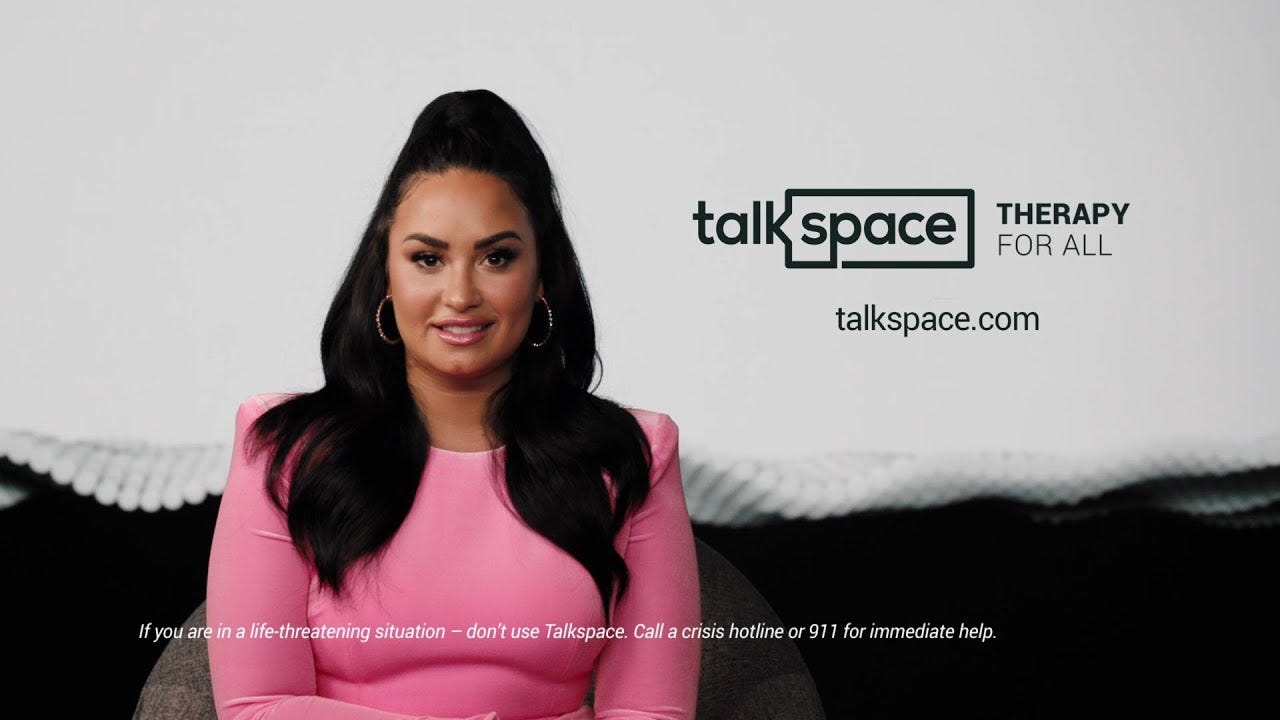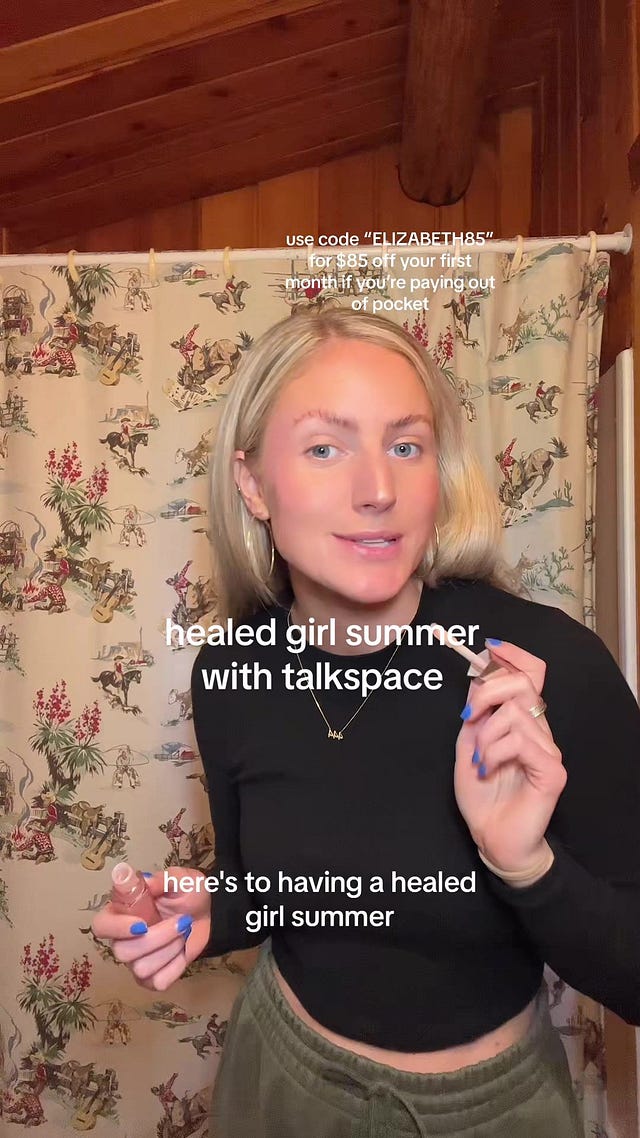No, Not Everyone Needs Therapy
“Big Therapy” tells us the solution to our problems is to pay a stranger
I can’t get away from ads for online therapy. Every YouTube video I watch harasses me to start my healing journey now. Every podcast I listen to pressures me to open up. I couldn’t even read about the situation in Gaza without BetterHelp telling me they’ve teamed up with the Israeli government to offer 6 months free therapy to those affected by the war!
They’re everywhere. BetterHelp wants me to try weekly video calls and texts with a therapist any time. Talkspace is desperate to give me mental health care from the comfort of my own device. There’s even been a rise in AI therapy bots recently like Wysa and Woebot, promising me a happiness buddy and a mental health ally. It’s an industry worth billions.
I have many problems with these therapy platforms. There’s a lot I could get into, like the use of Silicon Valley tactics or the selling of private data. But my major concern at the moment is that these companies promote and profit from what I see as an unhealthy therapy culture. By which I mean a culture that pathologises normal distress, and presents therapy as the solution to all problems. It’s this very modern vision of mental health that implies that you can achieve a perfect psychological state, that every emotion is diagnosable and solvable with some product or service. And it’s something I see as just another source of pressure on Gen Z. There’s pressure from the beauty industry to have the perfect face. Pressure from social media to have a perfect life. And now pressure from the mental health industry to have a sort of perfect soul.
Because what could possibly be more profitable than convincing young people they can smooth out all of life’s suffering? That they can heal from being human? Pay your way out of anxiety, and all those not very nice emotions! And if that doesn’t work, you obviously haven’t spent enough. Just as “Big Pharma” encourages us to take pills for our problems, “Big Therapy” tells us the solution to our struggles is to pay a stranger to talk to.
Just look at the way these platforms frame therapy. Therapy is for everyone, says Hers. Therapy For All is Talkspace’s slogan. Therapy shouldn’t be a last resort, Cerebral reminds us. And the reasons to go are getting increasingly vague. Do you deserve some self-care? Are you “worrying like, more and more?” Need help with “any issue you have in life”? Connect with a therapist now. And I can’t help but notice that a lot of this marketing is targeted toward adolescent girls—have a “healed girl summer” with Talkspace! Use the discount code “SLAY!” for 10% off BetterHelp! Try therapy for “sad girl thoughts” and “big girl depression”!
Which worries me because I think this idea that everyone needs therapy for every problem is unhealthy. I think it’s especially unhealthy to teach those young girls who aren’t mentally ill but are increasingly sad, anxious and risk-averse. The way I see it so much of mainstream culture is teaching them that they can’t cope with life. We’ve got a progressive movement rewarding them for feeling like victims and seeing everything as an injustice. We’ve got TikTokers telling them they are traumatised and mentally ill. And less talked about is this booming therapy industry indulging their every fear and anxiety, permanently there to remind them that they need professional help. I don’t know about you but I really don’t think being able to message a therapist 24/7 from your room is going to do anything for the resilience of an anxious, socially awkward generation.
And it’s weird to me that the mental health industry gets so little flak for this? Everyone’s all about empowering women and calling out men and the patriarchy and whatever else for patronising us. But what about the mental health industry? The industry that treats us like perpetual children? Companies like Hers that suggest women need to pay $99 an hour to handle “daily stressors”? Or Talkspace that shares anxiety reward stickers for making eye contact and getting through a phone call? I’m sure some of it is well-intentioned but it’s just so infantilising. Girls are anxious and struggling, yes. But a culture that insists they need constant reassurance and can’t handle any uncomfortable emotions without help will only make that worse. Especially when it’s pushed by companies that profit from girls feeling more fragile and dependent on their services.
But that’s not all that bothers me. Not only do I think these online therapy companies are cashing in on how anxious Gen Z is but also how atomised and alone. Teens today hang out less than ever with friends. They are detached from their local communities. Three-quarters of UK kids spend less time outside than prison inmates. Some are spending over 10 hours a day on screens.
And companies know this! That’s why we’re seeing all these AI therapy chatbots that feel like a real human being and are ready for conversation at any time of day. That’s why using Talkspace is like text messaging with a trusted friend! And why BetterHelp markets its therapists less like professionals and more like besties! “She’s my girl!” is how an influencer describes her therapist in one of their ads. “Being able to just…send a quick message and say hey this is happening…it was life-changing,” admits a woman in another BetterHelp ad. Life-changing? God that’s depressing. And makes me think that much of the demand for therapy now is not because we are an increasingly mentally ill generation but a desperately lonely one. So starved for human connection we will pay strangers just to have someone listen to us.
To be clear: I’m not saying that nobody ever needs therapy. Sometimes professional help is necessary. What I’m saying is we’ve swung from stigma to way too far in the other direction. Of course there are people who need help and are still ashamed to ask for it. But I also think there are people who now feel pressured to get professional help for normal negative emotions—teens and pre-teens convinced the reason they’re sad sometimes is because they’re broken and haven’t paid enough to be healed. Now not going to therapy is a red flag. Seeking support from friends and family is exploiting their “emotional labour”. And men are shamed for preferring to chat to their mates about their problems than pay a stranger, like that one BetterHelp ad where a woman dismisses a guy she’s dating because he “doesn’t do therapy”. Think about that! How have we reached the point where we’re stigmatising people for not needing mental health support?
To those girls getting inundated with this, I can’t say whether or not you need therapy. But what I can say you absolutely do need—what we all need—is human connection. Frequent, real human connection. Not some Zoom call that costs £90 an hour or automated texts from an AI chatbot. No, actual communities, stable families, and meaningful relationships outside of the market. Connections that come without discount codes, subscription fees or Silicon Valley tactics. If you are anxious or depressed and you don’t have these, that is the first thing to fix. Because I would argue there are a lot of young people struggling right now not because they are mentally ill but because they have no friends, barely go out and spend all of their time online. And they are being told the solution is to sit inside and talk to a stranger on a screen.
No. Not everyone needs that. Get off your screens. Build resilience. Invest in deeper connections before depending on these services. Because maybe you’re not struggling because you need therapy. Maybe you’re struggling because companies are taking your human need for connection, your normal feelings of stress and sadness, and using all this to sell solutions that leave you more anxious and alone. Because again: what could be more profitable?






Almost as if all the things we used to do naturally-- taking care of each other, taking care of our children, educating our children-- are being 'professionalized'; freeing up the people that otherwise have been doing those things (friends, parents) to engage in even more 'professions'. More tax revenue, more top-level control; more misery overall.
Thank you for the article
I’ve read this post and I think many of the points you make or allude to are not very good arguments. You also seem to have your own assumptions and you often respond to those rather than engage with the actual topics. I’ve written a response that’s longer than it should be, but if anyone bothers to read it, I hope you’ll see a better way to think about this topic. Here is my criticism.
.
1. You say that these companies pathologize normal distress and present therapy as the solution to all problems. But that is just your interpretation of it, and it’s based on the traditional perspective that’s similar to “therapy is for crazy people” (this is what people used to believe). Or perhaps closer to what you seem to believe: “Go to therapy when you’re suffering enough to warrant getting help”. Do you think that people should seek therapy only when they are suffering from depression, generalized anxiety, or PTSD? I think the smart thing to do is to go to therapy before this happens so that people can learn useful strategies they can use to deal with their problems before they get too serious and hopefully avoid them.
.
Let’s compare going to a therapist with going to the doctor. Some people only go to the doctor when they are very sick, which is sometimes too late for them to get less invasive treatment or, in extreme cases, to save their lives. Instead of doing that, I would argue it’s smart to do get your bloodwork done and see a doctor early on if you have a problem – even if it’s not a big problem yet. Do you have a mole that looks suspicious? Don’t wait until it grows a lot to have a doctor look at it. The same with therapy: don’t wait until you’re so depressed you can’t get out of bed in the morning.
.
2. In this article you’re basically using a straw man argument – claiming that therapy will solve all problems and heal you from being human, etc. I don’t know where you got this idea, but I doubt any therapist would say that’s what they are trying to do with their patients. The goal of therapy is to help people identify their problems (get a proper diagnosis if they have one), to help them understand themselves and learn useful strategies to help them deal with problems so they leave better lives. What exactly is the problem with this??? If they don’t suffer too much, people should just suck it up instead of learning how to express what they feel, think about it, regulate their emotions, or find useful coping strategies? Plus a therapist can observe a person and determine if what they experience is a normal reaction or a serious mental illness that needs to be treated differently.
.
3. You seem to have a problem with Big Pharma, but let’s be real: the pharmaceutical industry has saved many lives, it has cured many diseases, and helped prolong people’s lives while also making them better. Few industries do so much to help humanity. Is the problem that these companies don’t do it out of the goodness of their hearts but mainly for profit? Wow, a company that wants to make money! That’s crazy! This doesn’t mean that everything they do is great and there’s nothing to complain about, but then complain about the problems. If you have a valid complaint, express that rather than throwing around “Big Pharma” and “Big Therapy” like it’s supposed to be a good argument. Do you also have a problem with Big Food, Big Electricity, Big Book? The companies that sell these things also want to increase their profits.
.
4. You claim you’re worried that young people misdiagnose themselves based on the misinformation they see on TikTok (which is a big problem!). But what is the best way for young people to learn if they really have a mental illness or just a normal (or exaggerated) reaction to something that is happening in their lives? The best thing to do is…see a therapist who is a professional that can use the right instruments to assess what the person is experiencing, whether they need treatment or whether they just need to understand themselves and change the way they think about their lives.
.
5. As you mentioned, many young people are alone, or they don’t have many friends to talk to or they prefer to spend their time on their phones. And perhaps these therapy companies are trying to fill that gap. Why is that a problem? Maybe young people prefer having a therapist to talk to than trying to find new friends. Is this ideal? Maybe. Maybe not. But then, tell us: what do you think should happen? Should parents or governments force young people to go outside and talk to other strangers (for free) that may become their friends – if they don’t seem to do this on their own? Or do you think that if all these therapy companies close up shop, young people will magically throw away their phones and start to spend time outdoors talking to other young people in person?
.
6. You’ve created this antithesis between friends and strangers (specifically strangers you pay for therapy), while also talking as if they are pretty much the same thing. But they are very different, and they fulfill different roles – even if you seem to insinuate that most people don’t need therapy and they should just talk to their friends about it. Therapists can offer several things that friends cannot: 1. they have the expertise to observe and diagnose people if they have a condition, 2. they can provide support and teach you strategies based on scientific evidence, 3. they are less biased. Despite talking about friends and therapists (strangers you pay, as you keep saying), you seem to think that one can replace the other. That’s like saying that instead of paying a stranger to figure out what’s wrong with your body, you should just ask your friends and family about it. I’m drawing the parallel because a therapist should help you with the problems of your mind as a doctor helps you with the problems of your body. Technically you need a professional to help you figure out if your problems are normal or pathological. And the best way to find out if you need professional help is to book a consultation with one.
.
7. The people who don’t want to date someone because they don’t go to therapy are people who see therapy as a tool that can be used for self-knowledge and growth. If someone values that, it makes sense that they would prefer someone who values that as well. It’s similar to someone saying they want to date people who read non-fiction books or have an active lifestyle. It’s a matter of personal preference.
.
8. Another thing you seem to fail to understand is what people can do in their circumstances. Think about it. If someone really is struggling with depression, anxiety, distress or something else and they spend a lot of time indoors, using their devices, well then what do you think is easier for them to do: go outside and talk to strangers (for free, because paying for help is problematic as you’ve made it clear) or schedule a talk to a professional that can help them from the comfort of their home?? It’s obvious that the second one is a smaller step, therefore a step they are more likely to take – since, you know, these people may have their own challenges and cannot magically sum up the courage or motivation they need to do something that feels scary to them at first. Perhaps you do not have this problem so you may not be able to understand what it’s like for someone who does.
.
9. Your title insinuates that some people or these companies claim that “everyone needs therapy”. Yet from what you mentioned here, it sounds more like they are trying to normalize therapy (reduce the stigma associated with it) and to claim that everyone can benefit from therapy – even if not everyone needs it. However, honestly, I would go as far as to say that probably everyone needs a little bit of therapy. Many people have maladaptive coping mechanisms, dysfunctional dynamics in their relationships, and do things that either do not increase or actually decrease their wellbeing, so a therapist could help them identify these issues and help them find ways to manage them.